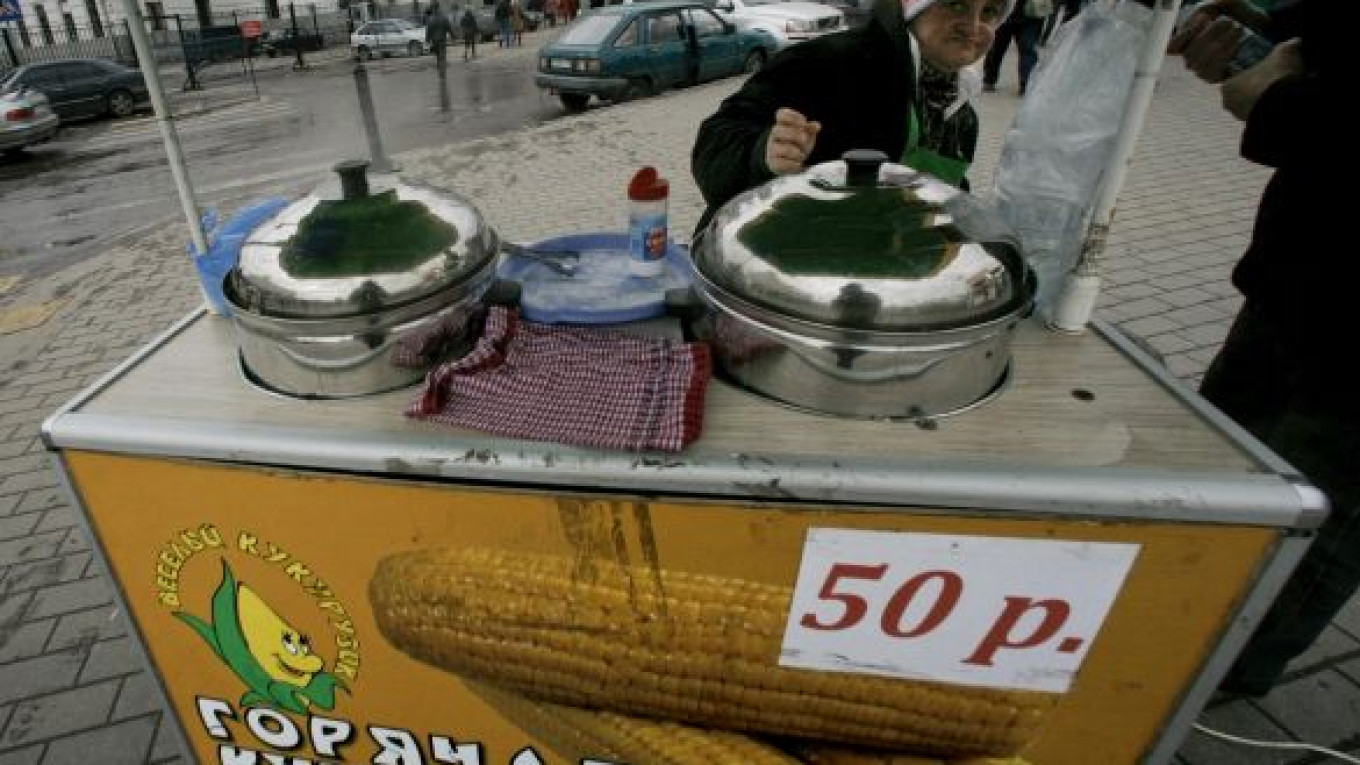Following an enthusiastic campaign to rid the city's streets of vendors, Moscow officials are blushing after it was discovered that no formal order to remove the kiosks was ever issued.
Owners of kiosks and other street businesses in Moscow won a respite Tuesday when the city government signed off on a draft order to regulate mobile, small-scale retail businesses.
As it turned out, the final document was relatively innocuous. The order requires the city's architecture committee to develop a new plan for the placement of small-scale retail businesses "taking into consideration the transportation situation, residents' needs and convenience of the location." The plan should be completed by May 1, 2011.
Until then, kiosks and pavilions may continue to operate in accordance with their current rental agreements. Mobile kiosks may operate under their current permits until the end of the year. Next year, city districts will award the permits as they always have — by tender.
The removal of retail tents and kiosks was one of Sergei Sobyanin's first decisions as mayor. During a trip to inspect the city earlier this month, Sobyanin stopped near the Ulitsa 1905 Goda metro station and took issue with the large number of kiosks, which he said blocked the view of a monument.
Later that day, the heads of two city districts — Presnenskaya and Tverskaya — were sacked. The next day, owners of street retail businesses all around Moscow began receiving orders from local officials to close down and move out.
The city government, meanwhile, never issued any formal order on kiosks. Officials began cleaning up the streets based on Sobyanin's verbal order, a source in City Hall told Vedomosti.
Getting the actual order approved with all of the necessary officials took a long time, and in the final draft there wasn't a word about tearing down kiosks, the source said. The document only mentions bringing order to the city's many small-scale retail operations.
Retailers said they still have not seen the new order, but they have noticed the change in approach.
"The elimination of kiosks has been halted, and the ones that were closed have been reopened," a flower vender working near the Akademicheskaya metro station told Vedomosti.
"The Mayor's Office and the consumer markets department made it sound like the traditional kiosks chains — selling newspapers, flowers and ice cream — would stay. We, in turn, recommended to our colleagues that they make sure all of their paperwork is in order," said Valery Yelkhov, general director of the Russian Ice Cream Union.
"The situation has returned to normal now, but a lot of kiosks were closed during the first few days," he said.
The Iceberry chain lost 30 to 40 outlets, Yelkhov said, while Russky Kholod had about 20 locations closed, and Altervest is short about 15 locations.
"So what's next for the people who followed orders and removed their kiosks or whose kiosks were hauled off by tow trucks?" asked Sergei Rak, development director of Markon Group, which runs the Stardog!s hotdog chain.
Moscow Arbitration Court on Monday registered seven lawsuits from Markon Group, which manages a network of about 150 Stardog!s hotdog stands, seeking to invalidate orders by the deputy prefect of the Northeastern Administrative District, according to materials on the court's web site.
Under orders from Moscow officials, Markon shut down 45 locations and another 15 will be required to close soon.
Click here to watch a video of a kiosk in central Moscow being dismantled.
A Message from The Moscow Times:
Dear readers,
We are facing unprecedented challenges. Russia's Prosecutor General's Office has designated The Moscow Times as an "undesirable" organization, criminalizing our work and putting our staff at risk of prosecution. This follows our earlier unjust labeling as a "foreign agent."
These actions are direct attempts to silence independent journalism in Russia. The authorities claim our work "discredits the decisions of the Russian leadership." We see things differently: we strive to provide accurate, unbiased reporting on Russia.
We, the journalists of The Moscow Times, refuse to be silenced. But to continue our work, we need your help.
Your support, no matter how small, makes a world of difference. If you can, please support us monthly starting from just $2. It's quick to set up, and every contribution makes a significant impact.
By supporting The Moscow Times, you're defending open, independent journalism in the face of repression. Thank you for standing with us.
Remind me later.


